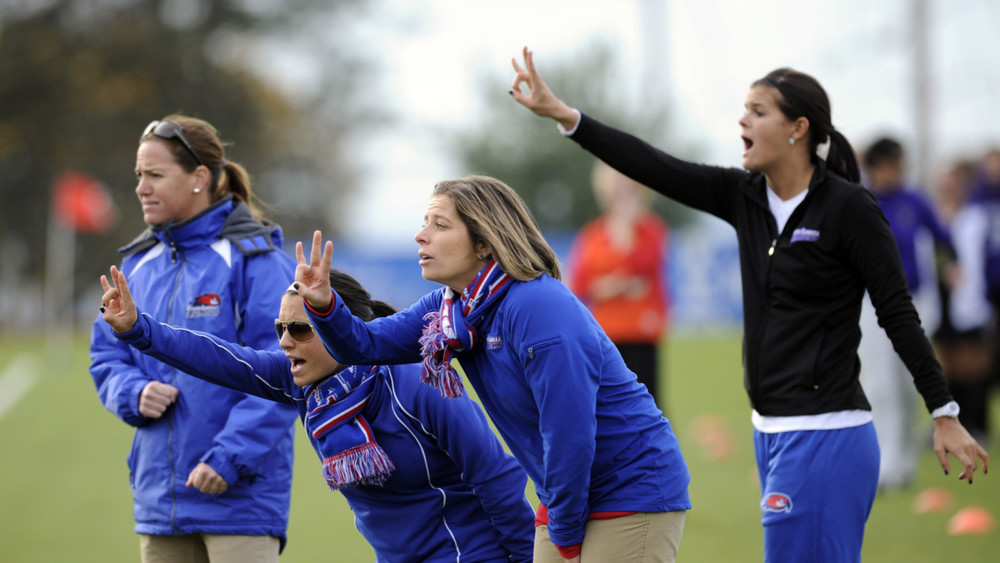By Jack Perry
The Providence Journal, R.I.
WWR Article Summary (tl;dr) This article takes a look at the shortage of women’s coaches in youth athletics. Bottom line, when it comes to coaching, it’s not often you see a woman calling the shots.
The Providence Journal, R.I.
Youth sports is a man’s world — at least along the sidelines.
Whether the game is being played by boys or girls, or boys and girls, the adult pacing the sideline and shouting instructions, the coach, is usually a man.
Would girls benefit from having more female coaches?
At least one reader thinks so.
“My granddaughter has played three middle school sports and three high school sports and I don’t think she’s ever had a female coach,” he writes in an email. “I really think that young girls (women, people) would benefit from having an adult of the same sex to talk with about growing up issues, boyfriend, etc.”
He didn’t want his name used, because he didn’t want to be seen as criticizing his granddaughter’s coaches, none of whom did anything wrong, he said, but I thought he raised an issue worth exploring.
Yes, it would be great to see more women in coaching, say three women involved in sports and surveyed for this column, but they stressed that any coach, regardless of gender, must know the sport and how to coach.
“I think it’s important for girls to see women in the position of authority and to recognize that women have that level of skill and expertise,” says Melissa Perkins-Banas, a cross country coach and a clinical neuropsychologist who specializes in sports neuropsychology. “I think it can be helpful to have a good, strong role model.”
A shortage of coaching role models from previous generations is one reason there aren’t more women on the sidelines today, says Katie Cameron, the head swimming and diving coach at Bryant University.
As the mother of three young children who play sports, Cameron has noticed the lack of women coaches from the younger ages all the way to the college level, where, she says, “There are very few female head coaches despite the large number of female athletes.”
Joyce Leven, registrar for the Seekonk Youth Soccer League, says, “There are not enough women in youth coaching, but many are also raising families, working, etc. … They may want to, but time doesn’t allow them to. I find that dad usually takes on that role, at least with our league and with the younger set.”
It doesn’t get easier as the kids get older and the competition becomes more serious, as Cameron can attest. A coaching career isn’t as conducive to raising a family as a 9-to-5 job is, Cameron says. At Cameron’s level, “Coaching is a 24-hour-a-day, 7 days a week commitment,” she says.
Cameron believes it’s “ideal for the athlete to be exposed to the different coaching styles. Female coaches may approach things from a different perspective,” she says, adding, “It’s good for young girls to realize that women can have such a positive impact on their athletic careers.
“With our staff, youth program and college, we ideally like to have a staff that consists of both men and women so that the athlete has the exposure to both,” Cameron says.
Wouldn’t young female athletes also find it easier to talk about life with a female coach, as the reader suggested in the email about his granddaughter’s sports experience?
Perkins-Banas says, “From a self-conceptual standpoint, sure, a woman coach might be more available to a female athlete. From a sporting perspective, I’m not sure it matters as long as the coach has high expectations.
“We know from research, the expectation from a coach is really important in determining how an athlete will do,” says Perkins-Banas, associate director of the NeuroDevelopment Center in Providence.
Leven, the Seekonk Youth Soccer board member, says it would be nice to see more women involved, but she doesn’t really look at coaching from a gender perspective.
“I think coaching consists of several key factors: loving and understanding the game, the ability to be unbiased, the ability to coach, and thick skin,” she says. “As long as the coach is committed to what they’re doing and have the kids’ best interest at heart, that would be the coach I would want, man or woman.”














































































































































































































































































































































































